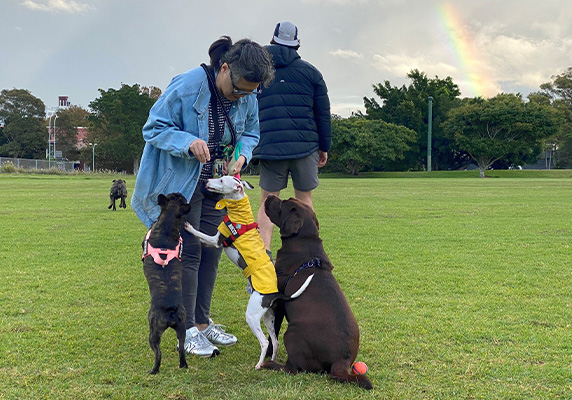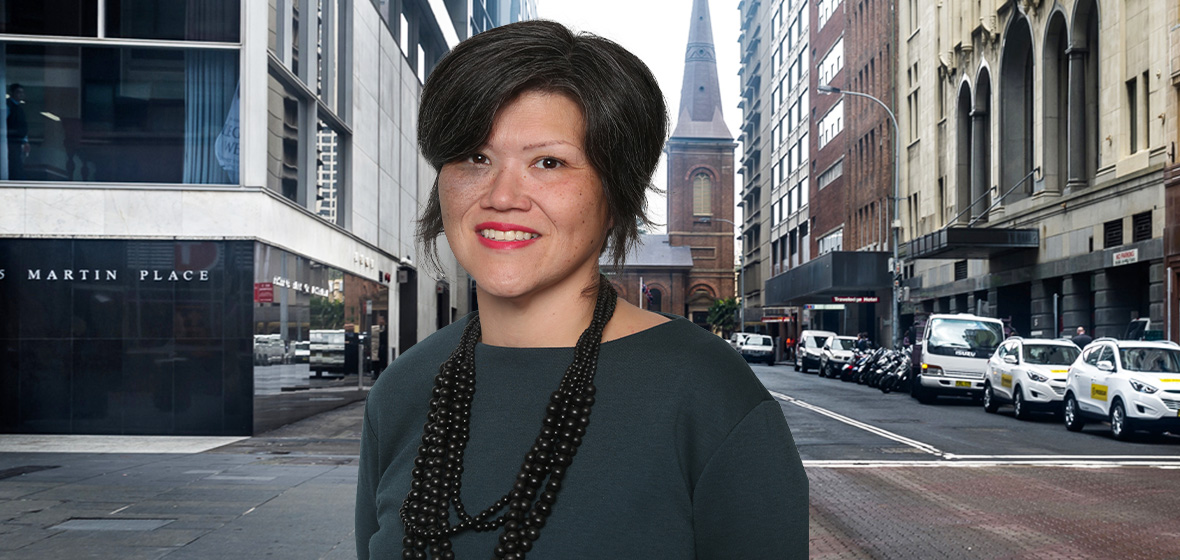For Jennifer Wong, being a government solicitor is the natural progression in a career that began with an early passion for justice. Her life has taken her in many directions, but always brought her back to a focus on the best possible outcomes for families with child protection issues.
Today Wong works as a Solicitor Advocate employed by the Crown Solicitor’s Office. She is Chair of the Law Society’s Government Solicitors Committee, and a Law Society Councillor. Her committee work with the Law Society began when she joined the Children’s Legal Issues Committee in 2016.
Her interest in justice began long before that time. “As a child, when things seemed unfair, I wanted to call it out,” she says.
“I was always interested in the law, but I didn’t get the marks to get into law straight away. I did a social science degree, focusing on policy, and being a policy writer I had an offer of a semester in an internship program with the federal government.
“All the interesting policy projects were going to the law students. So that decided it for me: I had to get a law degree if I want to do policy writing and research. I did graduate law at Sydney University. But I changed direction when volunteering at Redfern Legal Centre in my first year at law school. I was hooked: I wanted to work in social justice, in the community legal sector space.
“I spent the first seven years of my legal career in that space. I wanted to work within the Community Legal Centre sector because you’re at the coalface, you work to the smell of an oily rag, you’re lucky if you get a Bic pen. It’s all crisis management. The sector is poorly funded, but they work really hard, filling in the gaps where organisations such as Legal Aid can’t get to everyone. But I was getting frustrated. I was doing a lot of lobbying and community legal education, but not seeing fast enough effective change
Falling in love with the law again
So I left the community legal sector, and I trained through Australian Volunteers International, and ended up in Papua New Guinea, living in the Highlands in a remote village, producing a training manual for managing domestic violence for the Royal Papua New Guinea Constabulary.
“Working in a developing country was very confronting, and it galvanised me. Seeing the lack of access to justice made me realise I really wanted to remain a lawyer.
“I went to my local public high school, my parents rented because they couldn’t afford to buy a home. But from the time I started working in community legal centres and giving legal advice to everyone who walked through the door, and then working in a developing country, I realised how privileged my life really was. In child protection, when you’re looking at intergenerational trauma, when people are in desperate circumstances, when you’re looking at neglect, it makes you appreciate what you’ve had, and so I’ll often tell young lawyers, ‘Check your privilege’.
“So on my return from Papua New Guinea I started working for Victim Services as an assessor for victims’ compensation claims, which I found very rewarding and interesting.
“I was working mainly in assessments for historical child sexual abuse, and eventually I missed the courtroom, and that’s when I shifted. There was an opportunity for secondment into the child protection team with the Crown Solicitor’s Office, which eventuated to a permanent position. That’s an advantage of being a government lawyer: there are often opportunities to do secondments in different government departments. And that’s a flexibility that you don’t get in the private sphere.”
‘That’s an advantage of being a government lawyer: there are often opportunities to do secondments in different government departments. And that’s a flexibility that you don’t get in the private sphere.’
“And so that’s where I’ve been ever since: working my way up the ladder at the Crown Solicitor’s Office,” Wong says. “But in 2019 I did a 10-month secondment with my client, where I worked as a litigation solicitor in-house with the Department of Communities and Justice. And that was really beneficial for my professional skills.
“When I commenced working for the Crown Solicitor’s Office, former CLC colleagues asked ‘How could you work for the dark side?’ and my response was, ‘I’ve come from all that experience working in the community legal sector and now I’m the Department’s lawyer and they have to listen to me, I know what issues need to be raised.’
“And I thought, helping families, helping kids maintain an ongoing relationship with their parents, I’m still doing that. I’ve come full circle in terms of the child protection space. I started my career as the solicitor who gave legal advice to care mainly to carers and mothers, and now I work for the Department, and that has never gone away.
“Now I apply how I would have acted for a mother or for a carer. I apply that when I give advice to the Secretary, and I think there’s advantage in my having had that earlier experience. I would describe the advice I give as robust, because I can say ‘well, these are the issues, this is what it will actually mean in real terms for people’, and that can influence the decision making of a government organisation.”
Many roles, many paths
Wong observes that there are a variety of roles in the government law sector, and a variety of career paths.
“Through working on the Government Solicitors Committee, I discovered that government lawyers in and of themselves is a very broad church. There’s such a diversity of roles for lawyers within government: in-house counsel, litigators, researchers, speechwriters. There’s not a lot of scope to be reflective about who we are as a profession, and I think being actively involved in the Law Society and meeting other government lawyers has been really beneficial to give perspective on the work I do. It’s really good networking, and it’s a good area to get professional support.”
‘There’s such a diversity of roles for lawyers within government: in-house counsel, litigators, researchers, speechwriters.’
Wong advises law graduates, “I think you are best off, if you have the opportunity, of working in the private sector first. That’s optimal to get a sense of what to expect. In private firms, whether they’re large, medium, small suburban, there’s expectations there and pressures there in terms of business organisations, it’s a business making a profit.
“And a lot of people who I see who come to the public service as well as specifically joining the Crown Solicitor’s Office, in between two and five years out, these are often people who have spent time in the commercial areas of law. And have decided quite clearly this isn’t for them.
“There are particular aspects of being a government lawyer you need to be aware of, “ Wong adds. “There’s job sharing, there are less stressful work conditions; the pressures of billing in commercial law, in private practice, aren’t there. But, in terms of earning capacity and wages, I probably earn two-thirds of what I could earn in the private sector with my own law firm, working in child protection. And that’s something you’ve got to be realistic about if you’re wanting to work for government.”
Wong notes that many government organisations, including Legal Aid, offer targeted graduate programs. “With the Crown Solicitor’s Office, there are teams that cover different areas: the administrative teams who give advice to government, and the litigators who appear for the government in various courts and tribunals. You work across different teams and there may be options to stay on. These programs are highly competitive, though. Anyone interested in this kind of graduate program should also reach out to other government departments and look and see if they have a paralegal program. And then there will be opportunities to work your way up the chain.”
Leaving your interests at the door
Working as a government lawyer, Wong says, requires specific accountabilities. “There’s certain obligations and ethical duties that you have as a professional, that you ordinarily have as an officer of the court and as a legal officer, that are consistent across the board. But I suppose the one thing that government lawyers all have in common is that you really are responsible, answerable, to the government of the day, and your role is to assist it.
“There’s that aspect of having to leave your personal interests at the door. Which isn’t to say you’re not allowed to express an opinion, but you have to act apolitically because of what you’re doing in your role with a government agency or a statutory or regulatory service.”
She adds, “I’m a representative of the Crown Solicitor. And I have a duty as a legal officer in the context of working on the Crown Solicitor’s behalf.”
There is a heavy weight of responsibility in making decisions about child protection from the government perspective, Wong affirms.
“It’s not an easy decision to remove a child from the care of their parent. There has to be a significant risk to safety, welfare and wellbeing for a decision to be made by state authority to remove a child.
“It’s an interesting space at the moment to navigate, because of the overwhelming disproportionate numbers of Aboriginal and Torres Strait Islander children in the care of the Minister on an interim or permanent basis. So that is very challenging, and there is a real commitment by government and the courts to the Closing the Gap initiatives.
“My view is that in my role I have to provide robust legal advice, but that advice should also reflect social justice, and an understanding of what the government is wanting to achieve.”
Dealing with the weight of responsibility in her work is not easy, Wong says, and this is the case for many government lawyers. Becoming aware of the traumatic circumstances in which people live can be very stressful, Wong says. “It’s really important to understand vicarious trauma. I think one of the main areas for people who work in this space as government lawyers is burnout.”

Managing a difficult space
Having a good supervisor, Wong adds, is important for managing challenging issues.
“I have a clear supervision structure; I have excellent mentors with whom I can talk through these issues. Where your personal opinion is in conflict with your role, you need to be able to articulate quite clearly to supervisors that you have a concern, even, sometimes, a conflict of duty. You’ll have policy directions to guide you on a conflict issue. If it’s just that you’re not in agreement with the government of the day on a certain issue, it’s more about identifying what the issue is, and how serious it is. Mentoring and discussion may be [what you need]”.
It’s important to keep supporting government lawyers with dealing with stressful issues like this, Wong says, because it’s important to keep attracting young professionals to work in child protection law. “Child protection is not an easy legal space. It often comes down to government lawyers to deal with it – lawyers employed by the Department of Communities and Justice or through the Crown Solicitor’s office or by Legal Aid NSW acting for children, parents and family members.”
In her life outside work, Wong has found ways to deal with the stresses of working in child protection, and the added impact on her mental health when she worked in isolation during the pandemic. “I try to keep my home as a non-work zone. I like to cook. My Chinese grandmother’s way of expressing her love was through cooking for people; that’s a very cultural thing. I love to bake, but I don’t like sugar, so I take my cakes to work to share.”
Wong has also discovered the pleasure of being a dog owner. “I’ve become a crazy dog park person. I have a dog park tribe of friends … we’re all, like government lawyers, from diverse backgrounds. But we all love and look after our dogs the same way. We have something in common, and that makes us a community.”




